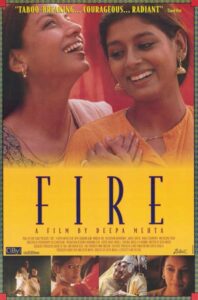To say Fire (1996) was a film that stirred controversy when it was first released in India is a major understatement. The Deepa Mehta-directed film was one of the first mainstream films in India to highlight a lesbian romance at the heart of the story. However, it caused quite a stir when it appeared on the big screen with religious groups and certain clusters of the community deeming it immoral or indecent. Despite its initial prohibition and denouncement by Hindu Fundamentalist formations, the queer legacy of the film cannot be argued. Fire was a film that ignited a spark of hope for many Lesbians across India and continues to do so to this day.
The film explores the sexual awakening of two neglected, married Indian women who find companionship and romance with each other. Despite having progressive ideals, Sita (Nandita Das) finds herself in an unhappy marriage with Jatin (Jaaved Jaffrey) who is having an affair with his mistress. Her sister-in-law, Radha (Shabana Azmi), also finds herself miserable in married life to Ashok (Kulbushan Kharbanda) as she feels subservient to him and is unable to have children. With both women in similar discontented predicaments, they find themselves drawn to each other and romance begins to blossom. By exploring a physical, emotional, and romantic relationship with each other, Radha and Sita get to experience the love they crave and deserve which they don’t feel they get from their husbands. Deepa Mehta’s directorial storytelling creates a powerful love story between these two women, one that is rarely represented in Indian cinema.

The film not only explores the suppression of female sexuality in India but also the deeply ingrained patriarchal culture that is embedded within society. Sita and Radha’s love is portrayed as forbidden, showing how women are denied control over their own sexualities but also the deep homophobic attitudes that exist towards lesbian women in India. By telling this story, Deepa Mehta shines a light on these topics and highlights the homophobic attitudes that still exist to this day. When Sita tells Radha what she has been taught about relationships and marriage growing up, we witness the extent to which females in India are taught patriarchal values at a young age. Sita tells Radha “A woman without a husband is like plain rice; bland and unappetizing”. As an audience, we see here how marriage between a male and female is so highly regarded in India that it dictates the way women are viewed and valued. It also shows just how ground-breaking the love between Radha and Sita is as they are embarking on a romance that goes against everything they have been taught about love and marriage. Both women also emerge as strong and triumphant by the end of the film which is a very rare aspect of this lesbian love story as it does not conform to a death or doom trope that many queer movies often do.
Though it was created in 1996 the film was not officially released until 1998 after being approved for adults by Indian censorship boards. Onscreen the film was a powerful ode to freedom pertaining to sexuality and gender relationships, however off-screen it was subject to intense scrutiny and discontent in certain pockets of Indian society. Its release in cinemas sparked violence and protests from Indian right-wing parties such as Shiv Sena whose members stormed and vandalised cinemas, chanted abuse, and burnt movie posters. In response to this backlash, lesbian rights activists like CALERI held their own peaceful protest gatherings across India with Deepa Mehta supporting many of these groups and protesting alongside them herself. The film clearly triggered a turbulent period combining praise and backlash. However, its legacy cannot be denied as an exemplary piece of Queer Indian cinema.
Sexuality and sexual orientation continue to be a topic in Indian society that has been regarded with secrecy, suspicion, and scrutiny. However, films like Fire which have overcome prohibition are crucial in telling the queer stories of India and overcoming homophobic attitudes. The queer legacy of this film is profound despite it not being well-received by some individuals in history. Had the film been released in modern society perhaps its ability to effect change and represent sexual liberation would have been better appreciated.
Tiyanna Mistry

